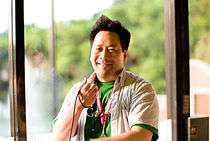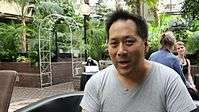Andrew Lih
| Andrew Lih | |
|---|---|
|
Lih speaking at the National Archives and Records Administration in 2015 | |
| Native name | (simplified Chinese: 郦安治; traditional Chinese: 酈安治; pinyin: Lì Ānzhì)[1][2] |
| Born | 1968 (age 47–48)[3] |
| Residence | Washington, District of Columbia, United States |
| Nationality | American |
| Other names | Fuzheado[4] |
| Alma mater | Columbia University |
| Occupation | Scientist and professor |
| Known for | studying various open technology cultures, such as Wikipedia and wikimedia |
| Website |
andrewlih |
Andrew Lih (simplified Chinese: 郦安治; traditional Chinese: 酈安治; pinyin: Lì Ānzhì; born 1968) is a Chinese American new media researcher, consultant and writer, as well as an authority on both Wikipedia and internet censorship in the People's Republic of China.[5][6][7][8][9] He is currently an associate professor of journalism at American University in Washington, D.C.[10]
Life and career
 | |
|
|
Lih worked as a software engineer for AT&T Bell Labs from 1990 to 1993. He founded the new-media startup Mediabridge Infosystems in 1994. He also obtained a Masters degree in Computer Science from Columbia University in 1994.[12]
From 1995 to 2000 he served as an adjunct professor of journalism at Columbia, and director of technology for their Center for New Media.[13] In 2000 he formed Columbia's Interactive Design Lab, a collaboration with the university's School of the Arts to explore interactive design for both fiction and non-fiction, including advertising, news, documentaries and films.[1] Soon afterward, Lih served as an assistant professor and the Director of Technology at the Journalism and Media Studies Centre of the University of Hong Kong.[1][14]
He then moved to Beijing, China,[14] where he lived until 2009. He currently lives in Washington, D.C., where he is an associate professor at American University's School of Communication.[15]
Wikipedia activity

Lih is a veteran Wikipedia contributor and administrator on the English Wikipedia under the username Fuzheado.[16] In 2009, he published the book The Wikipedia Revolution: How a Bunch of Nobodies Created the World's Greatest Encyclopedia. Lih has been interviewed in a variety of publications, including Salon.com[17] and The New York Times Freakonomics blog,[18] as an expert on Wikipedia.

Lih claims that editing Wikipedia with smart phones is difficult and this discourages new potential contributors. Lih claims several years running the number of Wikipedia editors has been falling and alleges there is serious disagreement among existing contributors how to resolve this. Lih fears these situations could imperil Wikipedia’s long term future.[19]
Selected publications
- Lih, Andrew (2009). The Wikipedia Revolution. New York: Hyperion. ISBN 1-4013-0371-4. OCLC 232977686.
References
- 1 2 3 "Andrew Lih." University of Hong Kong. Retrieved on February 28, 2012.
- ↑ "About." Andrew Lih Official Website. Retrieved on February 28, 2012.
- ↑ Andrew Lih's academic CV
- ↑ https://meta.m.wikimedia.org/wiki/User:Fuzheado
- ↑ Cohen, Noam. "Chinese Government Relaxes Its Total Ban on Wikipedia." The New York Times. October 16, 2006. Retrieved on February 28, 2012.
- ↑ Sydell, Laura (July 12, 2008). "How Do Chinese Citizens Feel About Censorship?". National Public Radio. Retrieved May 11, 2009.
- ↑ Johnson, Tim (May 15, 2008). "China relaxes grip on internet and media after quake". The Australian. Retrieved May 11, 2009.
- ↑ Branigan, Tania (August 2, 2008). "Beijing Olympics: Government U-turn ends ban on human rights websites". guardian.co.uk. Archived from the original on 30 March 2009. Retrieved May 11, 2009.
- ↑ Spencer, Richard (January 25, 2007). "China's growing number of internet users could exceed US". The Telegraph. Retrieved May 11, 2009.
- ↑ "New Media Expert Lih Joins School of Communication | American University School of Communication Washington, DC". School of Communication American University. May 3, 2013. Retrieved December 4, 2013.
- ↑ "How Wikipedia solved the knowledge gap, Andrew Lih, TEDxAmericanUniversity". TED (conference). Retrieved March 14, 2016.
- ↑ "Academic Curriculum Vitae". Annenberg.usc.edu. Retrieved 2013-12-04.
- ↑ Kramer, Staci D. (March 1, 2004). "Meet Columbia's New Media Guru". Online Journalism Review. Archived from the original on 15 April 2009. Retrieved May 11, 2009.
- 1 2 Fallows, James (March 2008). "The Connection Has Been Reset". The Atlantic. Retrieved May 11, 2009.
- ↑ "Joining American University in Fall 2013". Andrew Lih. 2013-05-02. Retrieved 2013-12-04.
- ↑ Sarno, David (September 30, 2007). "Wikipedia wars erupt". Los Angeles Times. Retrieved May 11, 2009.
- ↑ Rossmeier, Vincent (March 24, 2009). "Are we dangerously dependent on Wikipedia?". Salon.com. Archived from the original on 29 April 2009. Retrieved May 11, 2009.
- ↑ Mengisen, Annika (June 16, 2009). "By a Bunch of Nobodies: A Q&A With the Author of The Wikipedia Revolution". Freakonomics Blog. The New York Times Company. Retrieved June 23, 2009.
- ↑ Lih, Andrew (June 20, 2015). "Can Wikipedia Survive?". The New York Times. Retrieved August 1, 2015.
External links
| Wikimedia Commons has media related to Andrew Lih. |